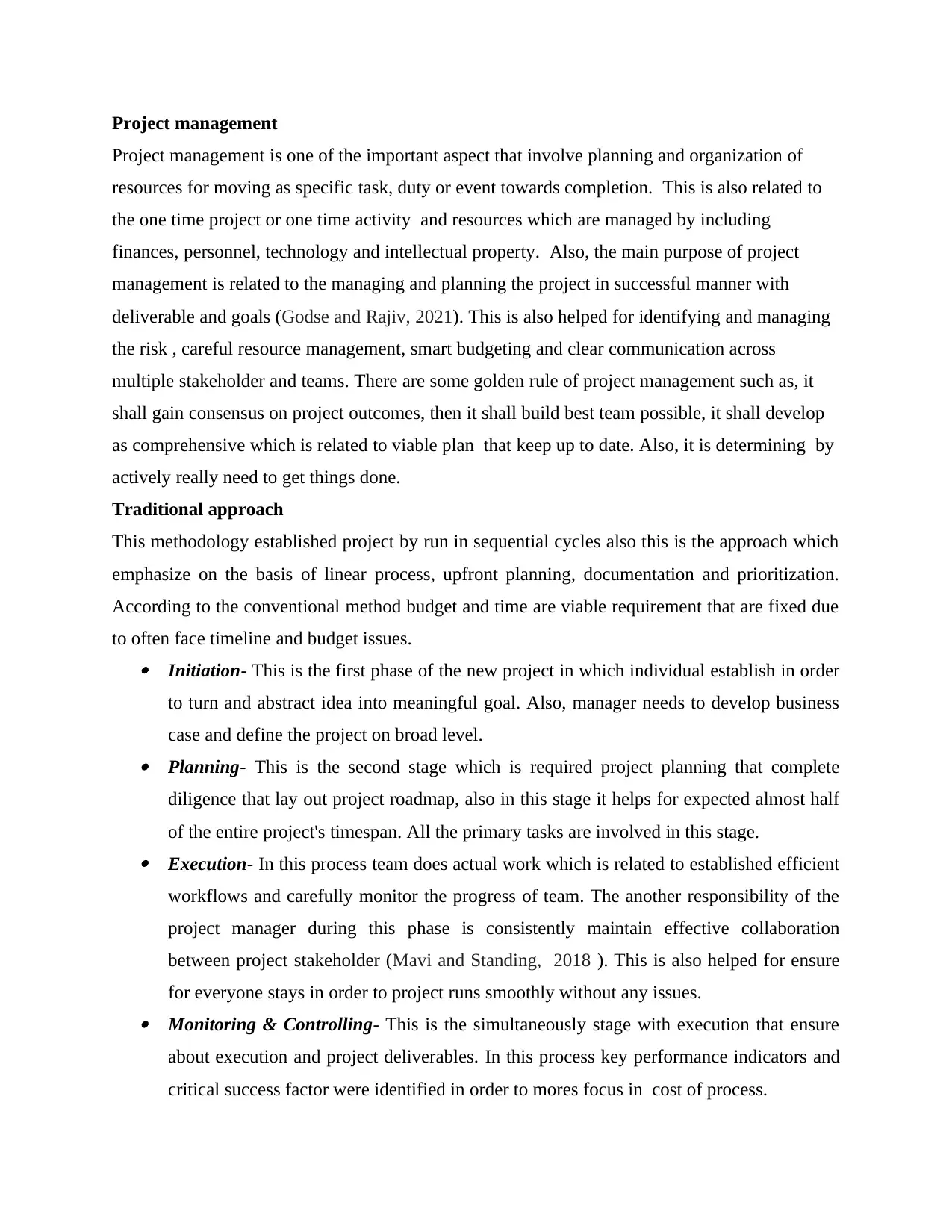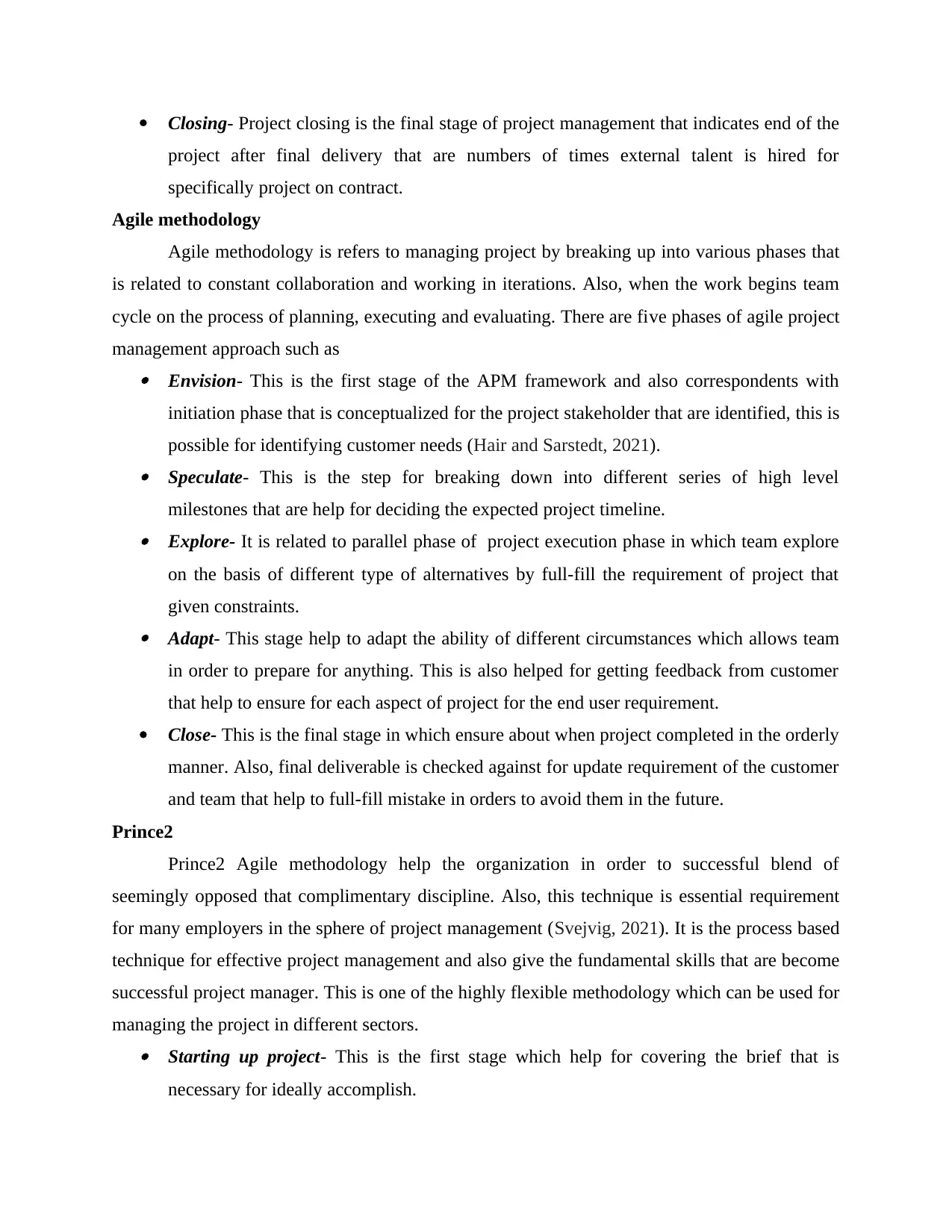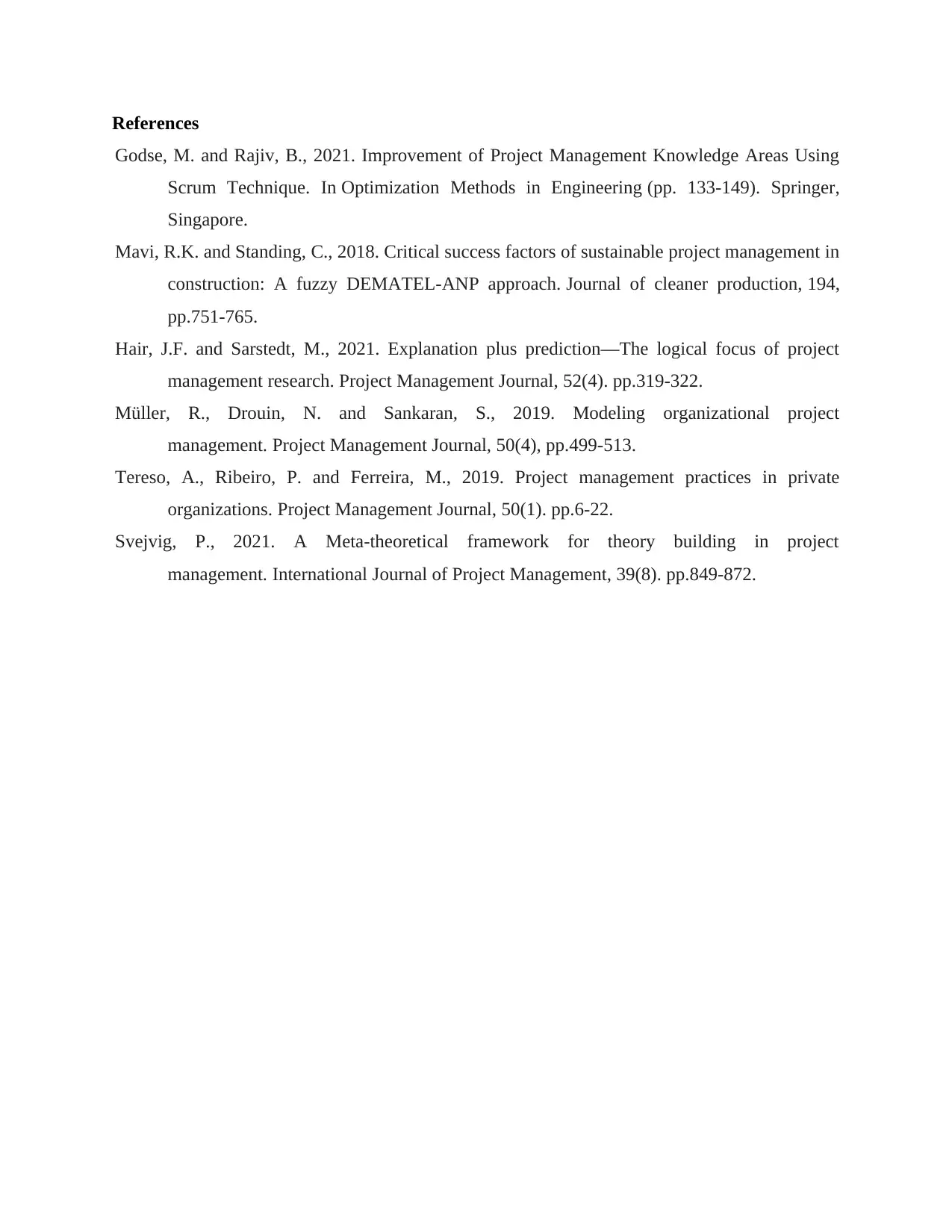Project Management Planning: Approaches and Techniques - BMP5004
VerifiedAdded on 2023/06/10
|4
|1289
|430
Report
AI Summary
This report provides an analysis of project management approaches and techniques, including traditional, Agile, and PRINCE2 methodologies. It discusses the various phases within each approach, such as initiation, planning, execution, monitoring, and closing for the traditional approach, and envision, speculate, explore, adapt, and close for the Agile methodology. The report also covers the PRINCE2 Agile methodology, highlighting its process-based technique for effective project management. It emphasizes the importance of understanding these approaches for successful project delivery and achieving project goals. The document concludes that project management involves managing resources like finances, personnel, technology, and intellectual property to complete specific tasks or events.

Project management
Project management is one of the important aspect that involve planning and organization of
resources for moving as specific task, duty or event towards completion. This is also related to
the one time project or one time activity and resources which are managed by including
finances, personnel, technology and intellectual property. Also, the main purpose of project
management is related to the managing and planning the project in successful manner with
deliverable and goals (Godse and Rajiv, 2021). This is also helped for identifying and managing
the risk , careful resource management, smart budgeting and clear communication across
multiple stakeholder and teams. There are some golden rule of project management such as, it
shall gain consensus on project outcomes, then it shall build best team possible, it shall develop
as comprehensive which is related to viable plan that keep up to date. Also, it is determining by
actively really need to get things done.
Traditional approach
This methodology established project by run in sequential cycles also this is the approach which
emphasize on the basis of linear process, upfront planning, documentation and prioritization.
According to the conventional method budget and time are viable requirement that are fixed due
to often face timeline and budget issues. Initiation- This is the first phase of the new project in which individual establish in order
to turn and abstract idea into meaningful goal. Also, manager needs to develop business
case and define the project on broad level. Planning- This is the second stage which is required project planning that complete
diligence that lay out project roadmap, also in this stage it helps for expected almost half
of the entire project's timespan. All the primary tasks are involved in this stage. Execution- In this process team does actual work which is related to established efficient
workflows and carefully monitor the progress of team. The another responsibility of the
project manager during this phase is consistently maintain effective collaboration
between project stakeholder (Mavi and Standing, 2018 ). This is also helped for ensure
for everyone stays in order to project runs smoothly without any issues. Monitoring & Controlling- This is the simultaneously stage with execution that ensure
about execution and project deliverables. In this process key performance indicators and
critical success factor were identified in order to mores focus in cost of process.
Project management is one of the important aspect that involve planning and organization of
resources for moving as specific task, duty or event towards completion. This is also related to
the one time project or one time activity and resources which are managed by including
finances, personnel, technology and intellectual property. Also, the main purpose of project
management is related to the managing and planning the project in successful manner with
deliverable and goals (Godse and Rajiv, 2021). This is also helped for identifying and managing
the risk , careful resource management, smart budgeting and clear communication across
multiple stakeholder and teams. There are some golden rule of project management such as, it
shall gain consensus on project outcomes, then it shall build best team possible, it shall develop
as comprehensive which is related to viable plan that keep up to date. Also, it is determining by
actively really need to get things done.
Traditional approach
This methodology established project by run in sequential cycles also this is the approach which
emphasize on the basis of linear process, upfront planning, documentation and prioritization.
According to the conventional method budget and time are viable requirement that are fixed due
to often face timeline and budget issues. Initiation- This is the first phase of the new project in which individual establish in order
to turn and abstract idea into meaningful goal. Also, manager needs to develop business
case and define the project on broad level. Planning- This is the second stage which is required project planning that complete
diligence that lay out project roadmap, also in this stage it helps for expected almost half
of the entire project's timespan. All the primary tasks are involved in this stage. Execution- In this process team does actual work which is related to established efficient
workflows and carefully monitor the progress of team. The another responsibility of the
project manager during this phase is consistently maintain effective collaboration
between project stakeholder (Mavi and Standing, 2018 ). This is also helped for ensure
for everyone stays in order to project runs smoothly without any issues. Monitoring & Controlling- This is the simultaneously stage with execution that ensure
about execution and project deliverables. In this process key performance indicators and
critical success factor were identified in order to mores focus in cost of process.
Paraphrase This Document
Need a fresh take? Get an instant paraphrase of this document with our AI Paraphraser

Closing- Project closing is the final stage of project management that indicates end of the
project after final delivery that are numbers of times external talent is hired for
specifically project on contract.
Agile methodology
Agile methodology is refers to managing project by breaking up into various phases that
is related to constant collaboration and working in iterations. Also, when the work begins team
cycle on the process of planning, executing and evaluating. There are five phases of agile project
management approach such as Envision- This is the first stage of the APM framework and also correspondents with
initiation phase that is conceptualized for the project stakeholder that are identified, this is
possible for identifying customer needs (Hair and Sarstedt, 2021). Speculate- This is the step for breaking down into different series of high level
milestones that are help for deciding the expected project timeline. Explore- It is related to parallel phase of project execution phase in which team explore
on the basis of different type of alternatives by full-fill the requirement of project that
given constraints. Adapt- This stage help to adapt the ability of different circumstances which allows team
in order to prepare for anything. This is also helped for getting feedback from customer
that help to ensure for each aspect of project for the end user requirement.
Close- This is the final stage in which ensure about when project completed in the orderly
manner. Also, final deliverable is checked against for update requirement of the customer
and team that help to full-fill mistake in orders to avoid them in the future.
Prince2
Prince2 Agile methodology help the organization in order to successful blend of
seemingly opposed that complimentary discipline. Also, this technique is essential requirement
for many employers in the sphere of project management (Svejvig, 2021). It is the process based
technique for effective project management and also give the fundamental skills that are become
successful project manager. This is one of the highly flexible methodology which can be used for
managing the project in different sectors. Starting up project- This is the first stage which help for covering the brief that is
necessary for ideally accomplish.
project after final delivery that are numbers of times external talent is hired for
specifically project on contract.
Agile methodology
Agile methodology is refers to managing project by breaking up into various phases that
is related to constant collaboration and working in iterations. Also, when the work begins team
cycle on the process of planning, executing and evaluating. There are five phases of agile project
management approach such as Envision- This is the first stage of the APM framework and also correspondents with
initiation phase that is conceptualized for the project stakeholder that are identified, this is
possible for identifying customer needs (Hair and Sarstedt, 2021). Speculate- This is the step for breaking down into different series of high level
milestones that are help for deciding the expected project timeline. Explore- It is related to parallel phase of project execution phase in which team explore
on the basis of different type of alternatives by full-fill the requirement of project that
given constraints. Adapt- This stage help to adapt the ability of different circumstances which allows team
in order to prepare for anything. This is also helped for getting feedback from customer
that help to ensure for each aspect of project for the end user requirement.
Close- This is the final stage in which ensure about when project completed in the orderly
manner. Also, final deliverable is checked against for update requirement of the customer
and team that help to full-fill mistake in orders to avoid them in the future.
Prince2
Prince2 Agile methodology help the organization in order to successful blend of
seemingly opposed that complimentary discipline. Also, this technique is essential requirement
for many employers in the sphere of project management (Svejvig, 2021). It is the process based
technique for effective project management and also give the fundamental skills that are become
successful project manager. This is one of the highly flexible methodology which can be used for
managing the project in different sectors. Starting up project- This is the first stage which help for covering the brief that is
necessary for ideally accomplish.

Directing project- The project board reviews and help for evaluating the project brief that
is based on business also viability and justification are necessary for approval. Initiating project- ins this stage project manager creates for comprehensive project plan
and baselines that is related to cost, quality, time, risk, scope and benefits. Also,
initiations document are approval for making project plan. Controlling project- In this stage project manager break down in order to work package
that passes them off to team managers and team to complete (Müller, Drouin and
Sankaran, 2019). Managing product delivery- project manager is responsible for deliverables in order
meeting Prince2 quality expectations. It is evaluating on the basis of complete the work
package and either approves them. Managing stage boundaries- In this project manager review the board of each stage that
help to makes sure about the processing according to order to plan for meeting
requirement of assurance. This is also related to holding retrospective with project team
by recording lesson and learned for improving next stage.
Closing a project- This is the final stages which is related to project is complete and
wraps up that may lose threads which is including in Prince2 reporting, documentation
and outcomes (Tereso, Ribeiro and Ferreira, 2019).
Conclusion
It has been concluded that project management is also helped for involving one time project or
other ongoing activities and resources that are necessary to manage in regard to finances,
personal, technology and intellectual property.
is based on business also viability and justification are necessary for approval. Initiating project- ins this stage project manager creates for comprehensive project plan
and baselines that is related to cost, quality, time, risk, scope and benefits. Also,
initiations document are approval for making project plan. Controlling project- In this stage project manager break down in order to work package
that passes them off to team managers and team to complete (Müller, Drouin and
Sankaran, 2019). Managing product delivery- project manager is responsible for deliverables in order
meeting Prince2 quality expectations. It is evaluating on the basis of complete the work
package and either approves them. Managing stage boundaries- In this project manager review the board of each stage that
help to makes sure about the processing according to order to plan for meeting
requirement of assurance. This is also related to holding retrospective with project team
by recording lesson and learned for improving next stage.
Closing a project- This is the final stages which is related to project is complete and
wraps up that may lose threads which is including in Prince2 reporting, documentation
and outcomes (Tereso, Ribeiro and Ferreira, 2019).
Conclusion
It has been concluded that project management is also helped for involving one time project or
other ongoing activities and resources that are necessary to manage in regard to finances,
personal, technology and intellectual property.
⊘ This is a preview!⊘
Do you want full access?
Subscribe today to unlock all pages.

Trusted by 1+ million students worldwide

References
Godse, M. and Rajiv, B., 2021. Improvement of Project Management Knowledge Areas Using
Scrum Technique. In Optimization Methods in Engineering (pp. 133-149). Springer,
Singapore.
Mavi, R.K. and Standing, C., 2018. Critical success factors of sustainable project management in
construction: A fuzzy DEMATEL-ANP approach. Journal of cleaner production, 194,
pp.751-765.
Hair, J.F. and Sarstedt, M., 2021. Explanation plus prediction—The logical focus of project
management research. Project Management Journal, 52(4). pp.319-322.
Müller, R., Drouin, N. and Sankaran, S., 2019. Modeling organizational project
management. Project Management Journal, 50(4), pp.499-513.
Tereso, A., Ribeiro, P. and Ferreira, M., 2019. Project management practices in private
organizations. Project Management Journal, 50(1). pp.6-22.
Svejvig, P., 2021. A Meta-theoretical framework for theory building in project
management. International Journal of Project Management, 39(8). pp.849-872.
Godse, M. and Rajiv, B., 2021. Improvement of Project Management Knowledge Areas Using
Scrum Technique. In Optimization Methods in Engineering (pp. 133-149). Springer,
Singapore.
Mavi, R.K. and Standing, C., 2018. Critical success factors of sustainable project management in
construction: A fuzzy DEMATEL-ANP approach. Journal of cleaner production, 194,
pp.751-765.
Hair, J.F. and Sarstedt, M., 2021. Explanation plus prediction—The logical focus of project
management research. Project Management Journal, 52(4). pp.319-322.
Müller, R., Drouin, N. and Sankaran, S., 2019. Modeling organizational project
management. Project Management Journal, 50(4), pp.499-513.
Tereso, A., Ribeiro, P. and Ferreira, M., 2019. Project management practices in private
organizations. Project Management Journal, 50(1). pp.6-22.
Svejvig, P., 2021. A Meta-theoretical framework for theory building in project
management. International Journal of Project Management, 39(8). pp.849-872.
1 out of 4
Related Documents
Your All-in-One AI-Powered Toolkit for Academic Success.
+13062052269
info@desklib.com
Available 24*7 on WhatsApp / Email
![[object Object]](/_next/static/media/star-bottom.7253800d.svg)
Unlock your academic potential
Copyright © 2020–2026 A2Z Services. All Rights Reserved. Developed and managed by ZUCOL.





